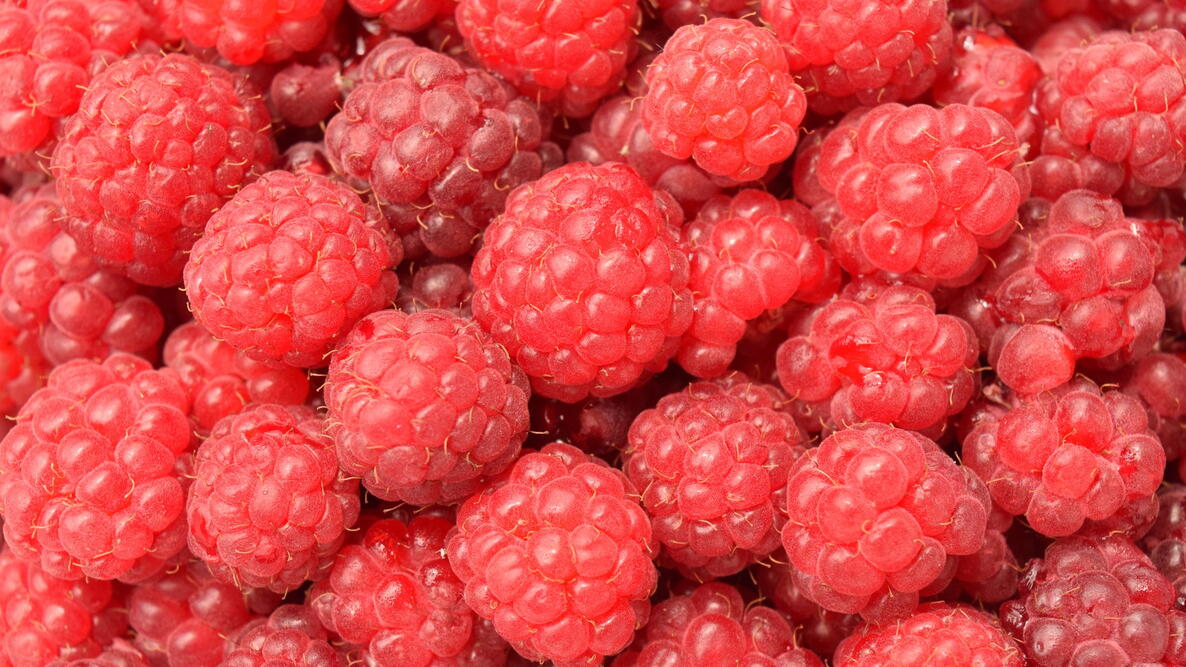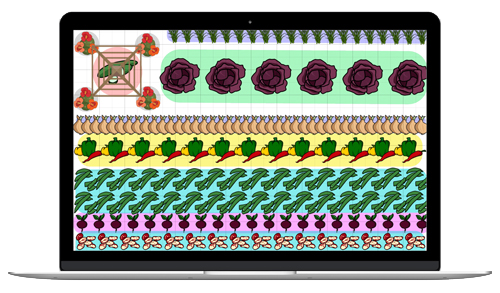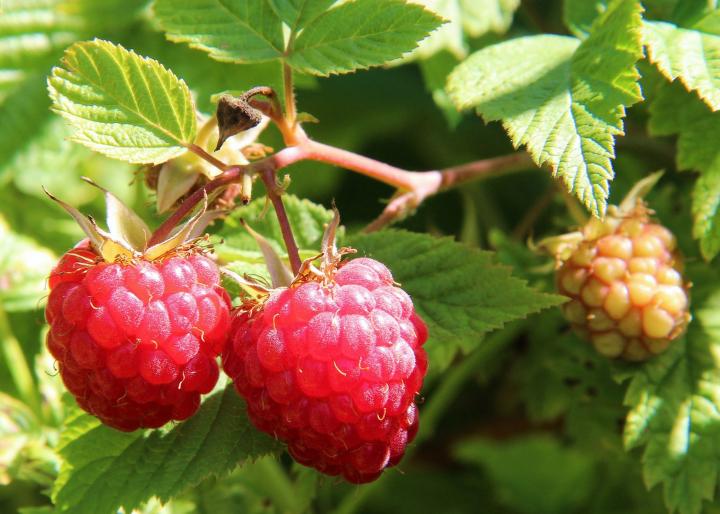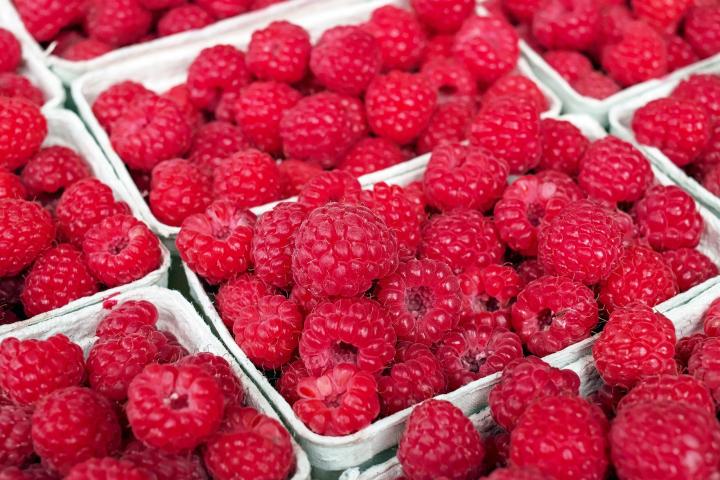
From Backyard to Berry Bowl: Your Complete Raspberry-Growing Guide
The Almanac Garden Planner - Use It Free for 7 Days!
Plan your 2025 garden with our award-winning Garden Planner.
Types
There are many, many raspberry varieties available today—and each one is unique! Ask your local garden center or cooperative extension service which raspberry varieties are best suited for your area. Here are a few to get you started:
- ‘Canby’: red berries; summer-bearing; nearly thornless; recommended for New England, Upper Great Lakes, and Northwest
- ‘Heritage’: red berries; ever-bearing; recommended for the Mid-Atlantic and Ohio Valley
- ‘Plainsman’: red berries; ever-bearing; does well in higher altitudes (the Rockies and High Plains)
- ‘Fallgold’: yellow berries; ever-bearing; recommended for the Upper Midwest and Canada
- ‘Double Gold’: yellow berries tinged with peach; ever-bearing; better for warmer areas, as the fall crop can be quite late
- ‘Royalty’: purple berries; summer-bearing; better for warmer areas
- ‘Jewel’: black berries; summer-bearing; disease-resistant, and great for warmer areas
- ‘Black Hawk’: black berries; summer-bearing; heat and drought tolerant
Tired of raspberries? Try your hand at growing blackberries, blueberries, or strawberries instead!
Cooking Notes
Fresh raspberries are wonderful in cereals or paired with a dollop of Greek-style yogurt or cream and an indulgent drizzle of maple syrup.
Freeze excess berries to use in smoothies and desserts, or make them into raspberry jam.
If the fruit is to be made into preserves, it should be done with fruit that’s as fresh as possible.
ADVERTISEMENT
You must be doing everything right, Neil! You could certainly thin out your raspberry patch by giving some away. Raspberries spread by runners, so lift them with plenty of root. And remember, it would take while for one to be many, so maybe give friends a few person.
We bought a house in CO (elevation 7,000ft) that had neglected fruit trees and a raspberry plant. We were only able to save a few of the trees, and the raspberry died back to the ground last winter. It is sprouting many leaves, and I hope to care for it so it can produce fruit next year. Can I cover it with a mound of straw or something this winter to protect it from the severe cold? I have no idea what type it is.
Hi Tracy,
Congratulations on your new house! It wouldn’t hurt to mound straw, mulch, or compost around the base of the plant. However, it may be going through it’s natural life cycle: Raspberry plants are biennials. Raspberry plants grow in long canes, growing during the first year and producing fruit during the second. After the two years, they die, leaving their seeded fruit or runners to continue the cycle. Your plant may be in its second year of life.
I have a raspberry patch at is about 16-17 years old. It produced extremely well until a couple years ago. I'm certain that a disease has gone through the entire patch. Very few berries for second straight year. Primo canes are getting yellow leaves, then they drop off and cane seems to die. I have about 20 percent of the plant density I used to have
Just three years ago I was picking 5-6 quarts from this patch every other day during the peak. I'd like to remove everything this fall and replant with some yellow in half of the patch and red in the other half in spring next year. This is really the only spot in my yard logical for raspberries
Any suggestions? Will disease carry over on this spot?
Unfortunately, your symptoms sound like a textbook case of Verticillium wilt—a soil-borne fungal infection that causes leaf drop, stem death, and sub-par fruiting in a great number of fruits and vegetables. Sadly, nothing can be done for an infected plant, and Verticillium wilt is capable of remaining in the soil for many years, so we would recommend planting any new raspberry plants as far as possible from the diseased patch.
When you remove the infected plant, consider replacing it with Verticillium-resistant plants, like irises, lilies, carrots, beans, or lettuce. A number of other common vegetables and flowers are also resistant.
2 years ago I planted 6 heritage raspberry plants. The first year they seem to die, but came back in the spring, had a lot of foliage, and produced a medium sized fall crop. I cut them back to the ground during the winter and mulched with straw from the feed store. This spring I saw the straw I had on them for mulch started growing... we noticed it was full of seed pods and took it all off and weeded well. We replaced it with white wood shavings. Now the plants are 20 inches tall and look like they are dying. The lower leaves are wilting and turning brown. Any ideas what could be causing this ... We have had a wet warm spring so I don't think they became dry at any time. Any help is appreciated.
Hi, Lee: Thank you for this question and your detailed description, including history. It seems as though one of two things is happening here, or perhaps both. We don’t know the condition of your canes, but your description of the leaves can indicate a disease or infestation of some sort. Assuming that you’re not noticing any insect pests, this would leave fungi and all manner of soilborne afflictions, of which there are many. Perhaps—by coincidence—your straw left something behind. More likely, though—and here’s #2—your canes simply became too wet, a condition that itself encourages fungi and that is encouraged by the wood chips, which act like a sponge. If it were us, we would do three things: (1) pull out and dispose of the wood chips, to get rid of both the sponge and any bad things in them; (2) try to find an organic fungicide that is safe for edible produce; and (3) contact your local USDA county extension service to see if they have more localized advice. We would also add a fourth—making sure that your soil drainage is OK—but your previous success with these plants would seem to indicate that this is not a problem. Just for the record, we have had two large and prolific patches at some distance from each other for decades and have never used mulch on them. Thanks again, and good luck!
I moved into a house that has beautiful raspberry bushes. I have to pick daily but I can't figure out how to store them other than freezing them because they get so mushy. They are wonderful straight off the plant but not that great even an hour later.
Lucky you! Freeze them this way: Put a single layer on a sheet pan. Put that into the freezer. When the raspberries are frozen transfer them to an airtight container or bag and return them to the freezer until you’re ready to use them. Repeat as needed with each harvest. They may clump a bit over time but they should not get mushy until thawed but even then some will retain some shape. Frozen or fresh, you can cook them up; here are are few recipes (including one with a sauce you can make and freeze): http://www.almanac.com/search/site/raspberries
If none of these ideas catch your fancy, call us and we’ll take bushels of those berries off your hands!
This has been terrific and helpful for me to read - so much information about the raspberries. Something that I wonder about is regarding the small size of my berries. My plants are producing raspberries that are so small, they aren't even worth eating! What do I need to do to change this?













